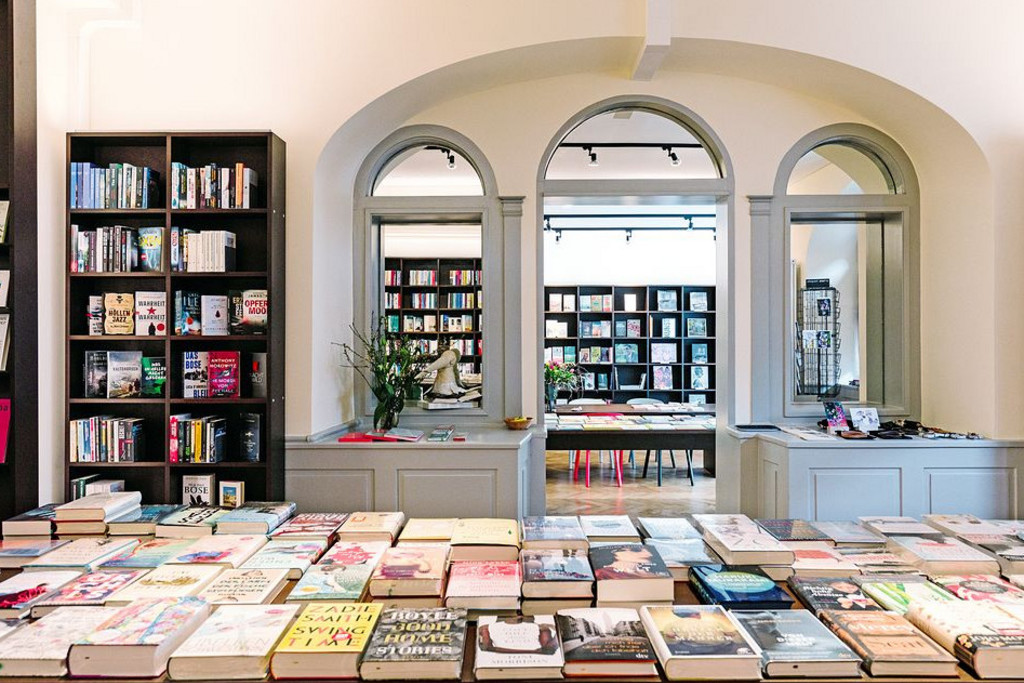A mellow light falls on the book tables from outside. The rooms have high ceilings and the furniture appears modern in a friendly way: the Buchzeichen bookshop in Langenthal, which is located in the canton of Bern, presents the book as a cultural asset and celebrates its aesthetics. For three women, the opening of the store this spring marks the fulfillment of a dream. They all have professional backgrounds related to books but are lateral entrants when it comes to entrepreneurship. For this, Beatrix Studer left her better-paid job as an upper secondary school teacher. “Of course the step required courage,” says the co-owner, but bookstores are on the rise again. “People like to spend time browsing among rows of books in a nice place,” Susanna Paoletti adds. As a businesswoman, she keeps an eye on the course of business.
The women from Langenthal are not alone. The last two years have seen the first openings of new bookstores, as registered by the Swiss Booksellers’ and Book Publishers’ Association (SBVV). Prior to that, there was mostly downsizing and crisis. In 2007, fixed book price agreements were abolished. Large online retailers such as Amazon came onto the scene. The sales of Swiss booksellers plummeted. Approximately 100 bookshops had to close in the German-speaking part of Switzerland alone. Today there are 200 stores left in the area. For SBVV’s Managing Director Dani Landolf, the fact that a counter-movement is on the rise is “a good sign”. The book industry was one of the first sectors to experience the explosive potential of digitalisation. “But we are still here,” says Landolf, “and we are doing a bit better than before”.
Books in the organic food store
The statement may contain a dash of calculated optimism, but there are figures to support it. The proportion of books sold online in Switzerland has stabilised at around 25 percent. In other words, bibliophiles still buy three-quarters of all books in stores. The book industry’s decline in sales has also slowed recently. 2018 could even result in a slight surplus, depending on Christmas sales. However, the positive developments did not happen of their own accord. Many booksellers realised that putting books on shelves was no longer enough to get people to go to bookshops. Bookstores have become meeting places with cafes, lounges, events and support clubs. The selection of books is carefully maintained. “Our selection is hand-picked,” says Beatrix Stuber, “our customers appreciate being inspired and receiving advice”.
Carol Forster, a bookseller from Appenzell, reacted early on. Her campaign is called “Lock-in and enjoy” and has been taking place in her bookstore several times a week for the past nine years. Groups or individuals can reserve the bookshop and browse through the available books. “We are always fully booked,” says Forster. She also focuses on purchasing locally. She delivers books ordered from her online store to stores in Appenzell’s Vorderland region. There are no more bookstores there, but the retailer Volg, the bakery, the organic food store and the cafe now run small book corners. “This is a way for village shops to support each other,” says Forster. And the conscious consumer, the consumer who is tired of globalisation, can contribute to a more lively place to live.
The look and feel of a book
Book publishers have been receiving cultural funding from the federal government for the past two years. But even in their case creativity has to flourish, and is doing so. “We are enhancing our profile,” Matthias Haupt says in the conference room of the publishing company Haupt-Verlag, which is located in the Länggasse district of the city of Bern. He runs the family business, which has been in the family for three generations. Today, Haupt-Verlag mainly publishes non-fiction books on nature and the environment as well as handicrafts and design. The focus in on quality, also in terms of the design. The publisher pulls out “Steine Berns”, a new geological excursion guide through the federal city. He almost tenderly strokes the rough cover. “The paper is inspired by sandstone,” he says. According to Haupt, the look and feel is an unbeatable advantage of the printed book.
Even niche books, which are produced in high quality, find a readership willing to pay for them. The sixth edition of the Flora Helvetica plant guide was recently published by Haupt. Virtually every wild flower that grows in Switzerland is mentioned in it. But it is a heavy load, even for flower lovers, weighing almost two kilograms. The publisher now combines the book with 21st century technology, an app for mobile devices. This also has its price, but is doing very well according to Haupt. Unlike newspaper publishers, the book publishers never made the mistake of offering their products for free online. “We are treading on thin ice,” says Haupt, “but the ice is supporting us”. He is more optimistic than he was five years ago.
More than a retro fad
One third of the books sold in Switzerland are fiction books, ranging from novels to regional thrillers. Biographies, and not only those written by celebrities, also do well. Even when they never go on sale. The cultural project Edition Unik lets people like you and me write down their life stories. They are guided through a writing program by a specially developed software and receive two copies of a printed book at the end. “People are still fascinated by books when it comes to giving away their own life story – to their children, family or friends,” says the founder and cultural entrepreneur Martin Heller. The participants know that they have produced something precious “and for them an elegant, sensuous book is more suitable for expressing this preciousness than a simple digital file”.
The printed book is alive. And this is most likely more than just a retro fad like the vinyl record. While more and more music is streamed online, the e-book has yet to establish itself in Switzerland. It has a market share of ten percent. The printed book has something about it that people obviously don’t want to give up, even in digital times: the physical interaction with it, undisturbed immersion in reading experiences. “People already spend far too much of their lives in front of computers,” says the bookseller Carol Forster, “they enjoy taking a break and holding a book in their hands”. Her colleague Beatrix Stuber stresses that she “has no desire to only be a manager of data”. And SBVV Managing Director Dani Landolf quotes the writer Umberto Eco: “The book is like a spoon – an invention that simply cannot be improved.”
A cross-section of the current Swiss book scene can be found on the page “Current book recommendations from Switzerland”.
Picture: The “Buchzeichen” bookshop in Langenthal represents a new trend: After years of downsizing, new and reimagined meeting places packed with books are being opened in Switzerland. Photo: Matthias Schneider











Comments
Comments :
I tried the electronic book. I lost interest soon also I think the electronic books are over priced. I prefer the feel of the printed book. I can easily go back to reread a passag, I can pass the book on in the family or give it to charity.
My dad in Switzerland was a great book collector and the books found the way to Australian. This collection is part of my youth and an electronic book collection could never have the same meaning to me.
Zudem habe ich als junge Erwachsene ein KV-Praktikumsjahr in Langenthal absolviert. Die Besuche im Stadttheater sind mir in bester Erinnerung geblieben. Ich selbst arbeite so viel am Computer, dass ich ebenfalls sinnliche Leseerlebnisse mit gedruckten Büchern vorziehe. Trotzdem biete ich neben den gedruckten Romanen und Kurzgeschichten auch E-Books an (Romane und Abenteuermärchen für Kinder) und finde, dass die beiden Formate sich wunderbar ergänzen, ebenso wie das Hörbuch für Menschen, die lieber zuhören oder sehbehindert sind. Eine liebe Bekannte nutzt als Pendlerin die Bus- und Zugfahrten, um auf ihrem Handy E-Books zu lesen, während sie zuhause ein Taschenbuch vorzieht. Das gedruckte Buch wird es hoffentlich immer geben, und der optischen und haptischen Kreativität sind keine Grenzen gesetzt …
Einen kuscheligen Leseherbst und friedliche Adventszeit wünscht Ihnen
Annina Boger